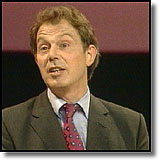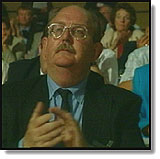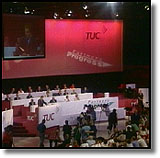
|
Blair Urges Unions to ModerniseThe Prime Minister, Tony Blair, has, as expected, committed his Labour Party government to re-introduce the right of people to be represented by a trades union.Mr Blair, who was addressing the British Trades Union Congress called on the unions to help create a just and fair society capable of meeting the challenges of a global market. Mr Blair was the first Labour prime minister to address the union congress for 19 years. Earlier, the Archbishop of Canterbury, George Carey, defended a worker's right to strike. He told the congress that employers had a moral responsibility to recognise their employees' representatives. Mr Blair told the conference: "By your actions lets make it impossible to dismiss trade unions as old fashioned, defensive, anti-progress, activist dominated. This is the agenda: I want to work on with trade unions between now and the new year. An agenda to build unions that are strong and relevant for the 21st century. A democratic, accountable union movement that can be a true partner with government and business." The Prime Minister delivered a rebuff to John Edmonds, general secretary of the GMB general union, who said yesterday: "A flexible labour market? When I hear the Labour government using Tory phrases, I shiver a little."
"We will keep the flexibility of the present labour market. And it may make some shiver, but I tell you in the end it's warmer in the real world," he said. Mr Blair emphasised that he would not tolerate a return to the union abuses of the 1970s and invited the movement to follow New Labour's example and modernise. "Modernise your political structures as we have done in the Labour party. Influence with this government and with me is not determined by anything other than the persuasiveness of your arguments. "The old ways - resolutions, the committee rooms, the fixing, the small groups trying to run the show - have no future. "New trade unionism - that is your aim. Partners for progress. That is your slogan," he said. "Let's build trade unions that are creative, not conservative, that show they can work with management to make better companies. "Unions that people join not just out of fear of change or exploitation, but because they are committed to success. "Unions that look forwards, not backwards, that support workers as they are, and foster the adaptability they need to be secure in a competitive and fast changing world." Mr Blair promised the unions there would be a White Paper on fairness at work early next year to set minimum standards to deal with bad employers. There would be a statutory minimum wage to tackle low pay, equal rights for part-time workers and the right for workers to belong to a union - and be represented by it - if a majority of employees in a firm want it. But he stressed: "As much as possible should be agreed with employers and there should be genuine dialogue to resolve potential problems." He also made plain there would be no return to the union power of the 1970s. "We will not go back to the days of industrial warfare, strikes without ballots, mass and flying pickets, secondary action and all the rest," he said.
PM's Speech WelcomedJohn Edmonds, general secretary of GMB general union, described the speech as "very interesting," adding: "Stressing unfairness was very welcome. I was quite encouraged by the idea that flexibility and fairness are not enemies." Bill Morris, general secretary of the Transport and General Workers Union, said: "It was a very measured speech. He has removed any doubts that he wants trade unions to be part of government projects. He wants a transparent relationship built on democratic values." Roger Lyons, general secretary of the Manufacturing Science and Finance union, said: "The movement should endorse Tony Blair's agenda to build unions that are strong and relevant to the 21st century and committed to success." One union leader suggested that unions should "refashion" their links with Labour including not holding any seats on the party's executive. Barry Reamsbottom, general secretary of the Civil and Public Services Association, said: "Mr Blair threw down a challenge that if we don't modernise we will not get much of a hearing from him. I am sure he would welcome a refashioning of the link and I believe should grasp the nettle now."
Blair Has "Repaid Unions"Mr Hague added: "Mr Blair has already given the unions their other two favourite policies - a minimum wage and Europe's Social Chapter. "He has been steadily repaying the unions for all the money they pumped into Labour's election campaign. But he has done so at the expense of more strikes, lost jobs and damage to British competitiveness. "Mr Blair arrived at the TUC conference with a £7 million IOU for the contribution the unions made to Labour during the election campaign. Today he started to pay it back."
|
Diana, Princess of Wales, 1961-1997
Conference 97
Devolution
The Archive
News |
Issues |
Background |
Parties |
Analysis |
TV/Radio/Web
Interactive |
Forum |
Live |
About This Site
News |
Issues |
Background |
Parties |
Analysis |
TV/Radio/Web
Interactive |
Forum |
Live |
About This Site
© BBC 1997 |
politics97@bbc.co.uk |


